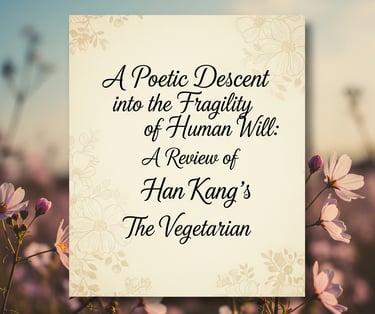Review of The Vegetarian by Han Kang - 2024 Nobel Winner
BOOKS REVIEW
Chaifry
5/31/20253 min read
Han Kang, the first South Korean to win the 2024 Nobel Prize in Literature, crafted The Vegetarian (2007), a haunting novel translated into English by Deborah Smith in 2015, which won the 2016 Man Booker International Prize. Structured as a triptych, it follows Yeong-hye, a housewife whose decision to abandon meat sparks profound personal and societal conflict. Through its exquisite prose, the novel probes themes of autonomy, trauma, and resistance within a patriarchal framework, offering a universal meditation on the human condition. This review argues that The Vegetarian is essential reading for its lyrical intensity, innovative narrative, and incisive critique of conformity, compelling readers to reflect on the cost of individual freedom in a world that demands compliance.


The Vegetarian unfolds through three perspectives—Yeong-hye’s husband, brother-in-law, and sister—each illuminating the fallout of her radical choice to stop eating meat after a disturbing dream: “I had a dream” (Kang, 2015, p. 13). In the first part, her husband, Mr. Cheong, views her as mundane: “Before my wife turned vegetarian, I’d always thought of her as completely unremarkable in every way” (Kang, 2015, p. 11). Her refusal disrupts his social order, leading to a violent family confrontation where her father attempts to force-feed her, prompting Yeong-hye to slit her wrist: “Blood had started to trickle down her arm” (Kang, 2015, p. 49).
The second part, narrated by her brother-in-law, an artist, reveals his fixation on Yeong-hye’s body, painting her with floral motifs: “Her body was not her body… it was the very image of the plant” (Kang, 2015, p. 104). This artistic obsession veers into exploitation, deepening her alienation. In the final section, her sister In-hye confronts guilt as Yeong-hye, now institutionalized, starves herself, believing she is becoming a tree: “All I need is sunlight… I don’t need food” (Kang, 2015, p. 159). The novel ends with In-hye’s anguished reflection on her sister’s defiance amidst a vivid, natural landscape.
The Vegetarian is a literary triumph, blending minimalist prose with visceral emotional depth. Kang’s tripartite structure brilliantly mirrors the fragmented perceptions of Yeong-hye, whose silence as a protagonist underscores her marginalization in a patriarchal society. This narrative choice amplifies the novel’s feminist critique, as Yeong-hye’s body becomes a contested space—her father’s violent force-feeding and her brother-in-law’s objectifying art project exemplify attempts to control her agency. The novel’s imagery, such as the “blazing green leaves” (Kang, 2015, p. 183) in the closing scene, juxtaposes vitality and decay, anchoring its surreal elements in profound emotional resonance. Kang’s subtle integration of South Korea’s historical trauma—such as the Gwangju Uprising—lends cultural weight, distinguishing it from Western counterparts like Sylvia Plath’s The Bell Jar.
However, Yeong-hye’s near-total silence can distance readers, as her inner world remains elusive, potentially limiting emotional connection. The translation, while lyrical, occasionally amplifies negative tones, such as Mr. Cheong’s description of Yeong-hye’s “jaundiced, sickly-looking skin” (Kang, 2015, p. 11), which may not fully capture the original Korean nuance. The surreal climax—Yeong-hye’s plant-like transformation—may challenge readers seeking narrative closure, though it powerfully symbolizes her rejection of human violence. Despite these limitations, the novel’s evocative prose and cultural specificity make it a unique, compelling work.
The Vegetarian is a mesmerizing exploration of defiance, identity, and the human cost of nonconformity. Han Kang’s poetic prose, innovative structure, and profound cultural critique create a transformative narrative that resonates universally. Minor challenges, such as Yeong-hye’s enigmatic silence and subtle translation variances, do not diminish its brilliance. This novel is highly recommended for readers who value literature that challenges societal norms and probes the boundaries of selfhood. Kang’s Nobel Prize underscores her mastery, and The Vegetarian stands as a timeless testament to the power of individual resistance.
References : Kang, H. (2015). The Vegetarian (D. Smith, Trans.).
